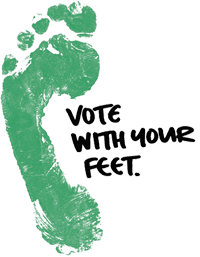The Volokh Conspiracy
Mostly law professors | Sometimes contrarian | Often libertarian | Always independent
Is voting with your feet selfish? Does it matter if it is?

Political scientist Mark Chou has a piece in Governing magazine commenting on my exchange on "foot voting" with J.D. Vance, the famed author of Hillbilly Elegy. In a recent New York Times op ed, Vance described his reasons for moving back to Ohio, and more generally argued that successful people should often consider moving to less appealing parts of the country in order to better contribute to society and bridge political divides.
In my response, I argued that successful people can usually serve society best by moving to where they can be most productive, and by doing more to break down barriers to mobility for the poor and lower middle class. Vance's own life story and his recent move to Columbus, Ohio in part exemplify these points. His own life was clearly transformed by geographic mobility, and his new home is not in an impoverished area, but rather one of the more economically dynamic cities in the country.
Chou worries that my defense of foot voting "revolves more around promoting individual self-interest than collective civic responsibility." I don't think this is true, or that it would be particularly problematic even if it were.
My view that foot voters who want to help society should generally choose the location where they can be most productive does not imply that they should only be motivated by narrow self-interest. For many people, probably the vast majority, their greatest productivity will indeed be the same location where they can maximize their self-interest (at least as measured by income). But for those who work for charitable enterprises or provide other nonprofit social services, that may not be the case. The same may be true for academics and some others whose main contributions to society do not come through for-profit work. I don't think that such people are immoral if they choose to live somewhere other than the location where they can help society the most. But I certainly applaud those who make sacrifices to help the disadvantaged or promote the public good.
That said, the vast majority of foot voters probably will make choices primarily based on what is good for them or their families. Their motivations may be self-interested. But there is nothing wrong with that. To the contrary, by moving to where they are likely to be happiest and most productive, they make society better off in two important ways: directly, by producing valuable goods, services, and innovations, and indirectly by incentivizing state and local governments to adopt policies that are more attractive to foot voters.
Jurisdictions have incentives to attract foot voters in order to increase their tax revenue, and entice investment. This reality undermines Chou's claim that self-interested foot voting "undermines the capacity of local and state governments wanting to employ foot voting to their advantage - as part of the solution to the problems they face." When Americans vote with their feet, they generally choose areas with cheaper housing, greater employment opportunities, and better-quality public services. Cheaper housing, better employment opportunities, and improved services can help the current residents of the communities in question, as well as migrants. It is good that foot voters incentivize subnational governments to compete on these dimensions. And we can take steps to make those incentives stronger, by fostering interjurisdictional competition.
Self-interested foot voters create important benefits for society as a whole, even if that is not their goal. Adam Smith famously wrote that "It is not from the benevolence of the butcher, the brewer, or the baker that we expect our dinner, but from their regard to their own interest." Similarly, much of the good that foot voters do arises from their regard to their own interest.
Like Chou and Vance, I agree that political polarization is a serious problem. But the available evidence does not indicate that foot voting (self-interested or otherwise) makes the problem worse, or that greater political diversity within jurisdictions would improve things. I doubt that foot voting in and of itself can do much solve the problem of partisan polarization and hatred. But that should not keep us from taking advantage of its many other benefits. Moreover, the increased political decentralization that can expand opportunities for foot voting more effective can also help alleviate hostility between supporters of the two major parties by reducing the winner-take-all stakes of national politics.
In sum, rather than trying to get foot voters to be more altruistic when making their decisions, we should instead focus our efforts on breaking down barriers to effective foot voting, particularly restrictive zoning and licensing laws that undermine the mobility of the poor. The latter is a far more promising strategy for helping the disadvantaged than the former.


Show Comments (0)